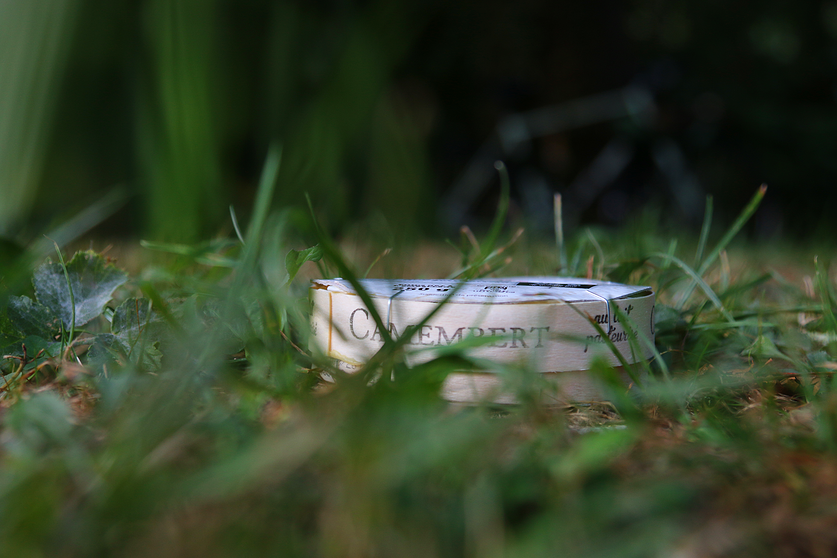
30 Sep 5: Molehills to mountains (Switzerland)
Chablis to Geneva (Aug 6 to 14: 280 miles)
Thigh update: manageable but mottled
‘Cobble’ is a great word, isn’t it? So cute and soft, but with a satisfying firmness at the edges, like a perfectly ripened plum or kumquat. It’s one of those words you can’t say just once, but have to really roll around the mouth and savour. Cobble cobble cobble cobble cobble.
The problem, however, is that the word cobble and the concept of the cobble are not the same thing. In fact, they are very different. And for far too long I feel people have been mistakenly confusing the two.
The fact is, cobbles are a menace. They may look pleasant; they may repel mud and dust, and grip well on horses’ hooves – but so what? Hooves are few and far between these days, and aesthetics a long-proven obstacle to modernity and progress. In many ways, cobbles are a worrying anachronism; a throwback to a bygone era of discomfort, hardship and haemorrhoids.
Why a civilised, 21st century person should be exposed to such indignities in this day and age is beyond me. Because, to be absolutely clear, there is no respectable way to cycle along a cobbled road. None. Believe me, I’ve tried all of them. Sit down and your rump is pulverised like an soft-boiled potato; stand up and you triumphantly impose said rump on the world. Go fast and you appear to be having some kind of seizure; go slow and there’s the concern people might think you’re enjoying it.
Almost every French town I go through has cobbles. They are ubiquitous to the point of a national obsession. Whether this is by choice, chance or some kind of psychological illness the nation has succumbed to en masse, I don’t know – but it has to stop. My suggestion is that we be done with them once and for all. Phase them out. Not immediately, perhaps, but gradually and inexorably over time. And I say this not just for me, but for every poor, innocent bystander who has had the unfortunate experience of seeing me glide into their home town over recent weeks with all the languid grace of an oversexed electron.
Avallon and Autun are cases in point. I arrive at the former from Chablis after a steaming, sweaty schlepp that tests my sluggish resolve to its limit and hit a minefield of the rotters like a bed of hot coals. Luckily, the town redeems itself by being otherwise charming, with a lovely 12th century church and an economy curiously dependent on the manufacture of gingerbread (it also, shockingly, has wifi).
From Avallon, the road to Autun is not a happy one. Having had no rest days so far, I am spent almost before I start. By noon, I have run out of food and water, and start to imagine the hay bales as giant water buffalo angling for attack. Ten days in the saddle and I’m clearly already turning into some kind of deranged female Don Quixote, one step away from a punch-up with a horde of belligerent windmills. Crazy thoughts start to fill my head — like ‘what the hell am I doing here?’, ‘maybe I should have done some training’ and ‘why are the cows all so enormous?’
I am less worried about my mental breakdown than my physical aches and pains, however. My lower back burns, shooting pains spear my left leg and my Achilles tendon creaks ominously. More concerningly, I seem to be losing the use of my right hand completely. Simple tasks are now beyond me, like taking the top off the toothpaste or swearing at bad drivers. A series of increasingly alarmist internet articles tell me I have something called ‘handlebar palsy’ from putting too much pressure on my ulnar nerve, and should stop cycling immediately or risk crippling myself permanently. Perhaps I’ll end up losing my hand altogether, I ponder, and become one of those celebrity amputees who wins the love of the nation by raising money for disabled children while climbing Kilimanjaro. I imagine being interviewed by Jon Snow and the tone I’d assume: modest and stoical, with a hint of self-deprecating charm. I’d be a massive hit, I know it.
It’s a reassuring thought, but I can’t distract myself for long. My thermometer reads 36 degrees and the hills feel monstrous as the sun beats down. The first is a fully blown masochist*, rising steeper at every turn, and I feel like Sisyphus heaving his rock up the mountain, ceaselessly, fruitlessly. I try different techniques to urge myself up: the little engine technique (“I think I can, I think I can, I know I can… of course I bloody can’t!”); the Ranulph Fiennes technique (“plod forever, die high”); and the self-flagellation technique (words that don’t bear repeating). I console myself with the thought that at least I still have some emergency Chablis left in my thermos in case I feel the need to quietly crawl into a mossy lay-by and expire.
That time comes sooner than I expect. At the 43-mile mark, I am finally done in and collapse in a heap at the side of the road. There’s no way I’m going any further, I decide, so there’s only one thing for it. Cheat.
With no other options available, this means catching a ride from some kind, big-booted passer-by. I feel a little nervous about it, if I’m honest. The last time I hitchhiked was in Mexico in 2004, when I’d been forced to accept a lift from a textbook psychopath (beady eyes, unscrupulous sideburns) after waking up three hours late for my bus back to California with a splitting headache and a Chinese tattoo meaning ‘bottoms up’ mysteriously inscribed on my lower back. I hadn’t intended to go with someone like him – I’d been aiming for a nice apple-pie family with a couple of brats and a labradoodle – but no-one else would stop for me, strangely.
This time I do better. After 20 minutes of ruthless rejection, during which I half-heartedly stick out my thumb while sitting on my panniers munching a packet of Haribo, I finally stand up and throw myself into it with gusto. A pick-up truck stops immediately, driven by two semi-naked Adonises and an older gentleman. I’ve struck gold! Rushing to their window, I suddenly hear myself telling the barefaced, brazen lie that I’ve hurt my ankle and need to get to the next town for help. It’s a deeply shameful moment that I take no pleasure in recounting here, and that I have absolutely no doubt I would repeat again given the smallest opportunity.
When we arrive, after just 20 gloriously efficient, engine-fuelled minutes, the older man asks if I want a hospital. I assume he is making a joke about travelling in the bumpy truck and shake my head, guffawing loudly. It’s only as I bound away like a gamboling fawn that I remember I’m meant to have a twisted ankle, and break into a belated, deeply unconvincing Keyser Söze-esque limp. (I’m not proud, I’m really not.)
The next day is my birthday and I take the day off as a treat. I wake to the sound of rain and a silky cool breeze, which is a blessed relief after the searing heat of the past week. I feel a little melancholy, however, and wonder if I’m lonely. Am I, like Virginia Woolf, already getting impatient of solitude, of its draperies and sweltering vapours? Am I desperate for company — to speak, hear, be heard?
It turns out I’m just hungry. Two beef bourguinons later and I’m fully recovered. I realise I haven’t eaten properly for days, and I gorge myself shamelessly, senselessly, washing it all down with glasses of delicious, creamy Pinot Noir and Beaujolais. In France, you really have no choice. It’s a sign of cultural respect.
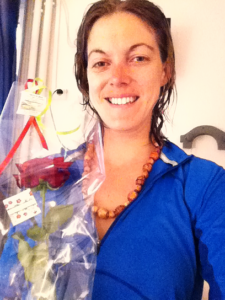
A mystery birthday gift from a secret admirer, going under the pseudonym ‘Monsieur Joyce’. Who could it be?
The following day, my hand is still a dead weight and it’s starting to worry me. What if I have to end the trip prematurely? Jon Snow isn’t guaranteed to interview me, no matter how many times I climb Kilimanjaro. Perhaps a more subtle version of the film ‘127 Hours’ could be made about the first 12 days of my trip, I console myself, in which my hand gets increasingly achy until I have to seek medical attention? We could throw in the topless truck drivers and call it ‘One and a Half Weeks’ in the hope people might think it’s somehow related to the Kim Basinger classic.
A little anxious, and with the rain still hammering down, I decide to rest my hand a second day and take the bus to Chalon-sur-Saone. It’s a large, attractive town on the Saone river that was once home to Nicéphore Niépce, the inventor of photography and – in keeping with my newfound appreciation of motor vehicles – the world’s first internal combustion engine.
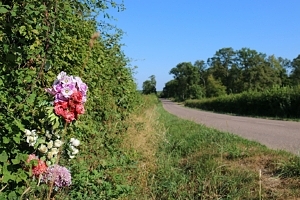
Flowers in hedge en route to Oyonnax. The French put flowers everywhere, which is really rather lovely.
I am behind schedule, however, so decide to move swiftly on towards Switzerland, where I can have my bike adjusted to take the weight off my wrists. I pass through Bourg-en-Bresse and Oyonnax – hilly, buttock-pummelling rides – before commencing my final push to Geneva. Here my labours finally bear fruit, as slow, uphill slogs morph into triumphant, winding descents. Emerald lakes, plush valleys and thick, tree-clad gorges surround me, robed in morning mist. Truly beautiful.
Then, suddenly, I am in Switzerland. I am surprised not to have been asked for my passport, and discover afterwards it is one of four non-EU members of the Schengen Agreement to eliminate border controls. It’s a good feeling, swooping seamlessly into another country without any kind of barrier. On a global scale, this is surely the ideal — a world without boundaries, where all can move freely — even if forever elusive in reality.
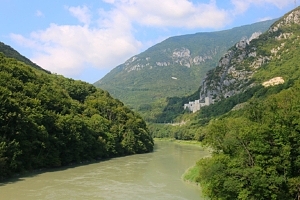
Beautiful views on winding hillside passes towards Geneva. Mainly downhill after tough first stretch, thank god.
After an enjoyable back-route wheedle into Geneva, courtesy of my Garmin satnav**, I emerge in the bustling city centre. Trams and buses whisk by, swift and perilous, and chain stores loom at every turn. Everyone speaks English, as nearly half the residents are ex-pats. After two weeks in prehistoric France, it all seems intimidatingly dynamic. I feel a mixture of relief and disappointment, as though returning to the familiar comforts of home from a Where the Wild Things Are rumpus in the wilderness.
In fact, I have mixed feelings about Switzerland generally. Is it good or evil, a sinner or a saint? While most European states are content to exist in a murky grey area of moral ambiguity — neither particularly good nor bad — Switzerland seems to swings wildly between the two extremes. As the global headquarters of diplomacy and human rights, it is home to the UN and Red Cross, and provided the setting for the Geneva Conventions. On the other hand, it happily acts as a shadowy playground for rich financiers via banking secrecy laws that perpetuate criminality and inequality across the world.
For me, the country is a little like a rich, philanthropic uncle who I like and respect, but whose polished, professional exterior belies a myriad of unsavoury secrets — not to mention a deeply traditional set of social values. My friend K, who very kindly offers me a bed while I’m in town, tells me that women are not expected to work, especially when they have children. When she and her husband wanted to open a joint bank account, the bank at first simply offered her power of attorney over her husband’s account, surprised to discover she had an income of her own.
There is also a worrying strain of racism among society, she adds. In 2009, a constitutional amendment banning the construction of new mosque minarets was approved in a national referendum by 57.5 per cent of the vote, with only four of the 26 cantons opposing. As part of the campaign, a group of mainstream, right-wing politicians from the Swiss People’s Party and Federal Democratic Union released posters of niqab-clad women standing beside minarets that resembled missiles.
Eastern Europeans, especially Romanians, apparently face similar prejudice. Border controls were lifted six years ago and many people remain unhappy about it, K tells me. There is some basis for such feelings, she concedes: people used to keep their homes open at night; now theft is reportedly more commonplace and doors kept firmly locked.
It is a sad counterpoint to the Schengen ideals. Country borders may dissolve, but new, stronger ones emerge – between people, communities, cultures. In a world of winners and losers, where wealth and opportunity seem so arbitrarily apportioned, it’s perhaps inevitable. And as the world casually gets on with its business, the gap is slowly growing.
To do my part in the global game of laughter and forgetting, I dwell only momentarily on the gross injustices of the human condition. Instead, I slip into a deep, refreshing sleep, undisturbed by the figments and phantasms of my unruly subconscious for the first time in days.
* See blog ‘Departing Dieppe’ for rundown on different types of hil
** Official sponsor


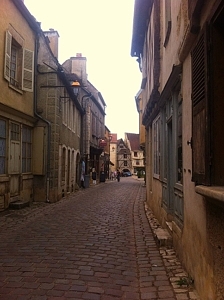
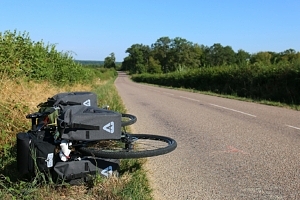
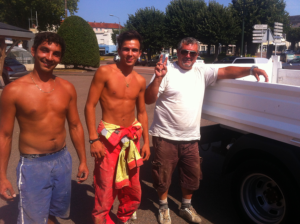
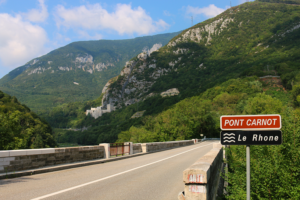
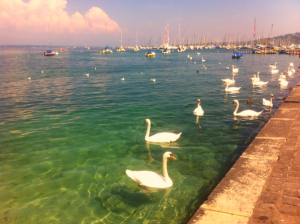
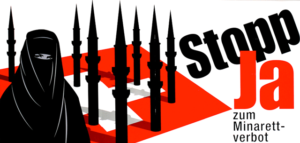
Katalin Lowe
Posted at 10:10h, 09 OctoberLovely stuff Bexi, as always, but now I am very worried about your hand and the ‘handlebar palsy’ you seem to have developed. Nothing wrong with a few bus and train trips, you can still mix with the natives and see the scenery. You could even keep quiet about them if you like!
Keep the blogs coming, darling, they are always a great treat!
Lots of love from your ever-anxious Mother
Max Goldzweig
Posted at 14:49h, 09 OctoberThe thought of you impersonating kaiser soze made me choke on my breakfast waffle. Re the cobblestones, I remember being on holiday in Rome and thinking I could never live in a city where I would have to commute over cobblestones. Vicious bastards. Keep up the good work!
Bex
Posted at 10:03h, 21 NovemberAnd they’ve been haunting me ever since across the Balkans, the fiends! How are you guys getting along? Have you left Mexico yet? Have you started muling for any kingpins to buttress the coffers a little? Much love, Bex x